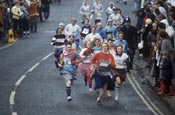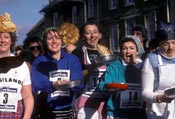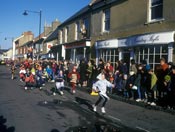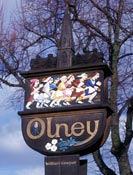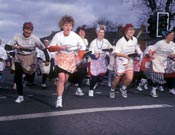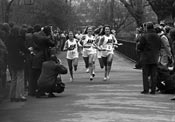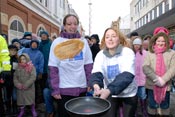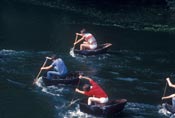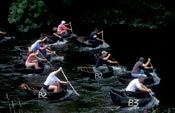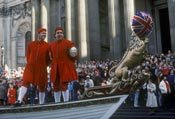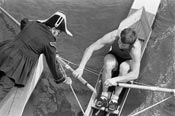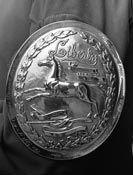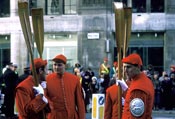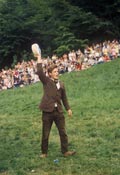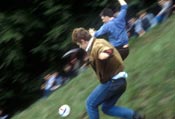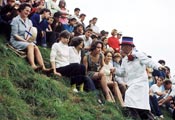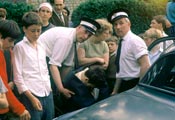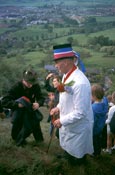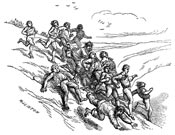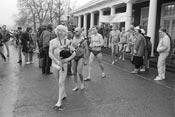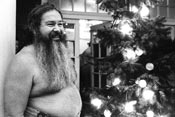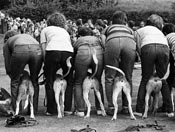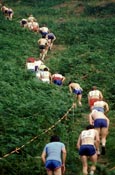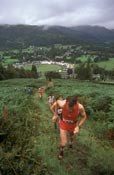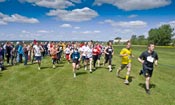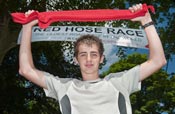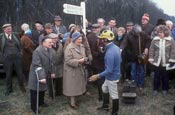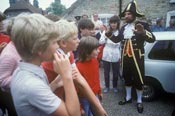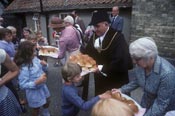
Here are some days at the races. The Olney Pancake Race on Shrove Tuesday is the most famous and possibly the first, since it is said to have been run since 1445. It has an unconvincing legend that a lady heard the ‘Shriving Bell’ to summon everyone to the church to be purged of their sins before Lent. She was making pancakes to use up flour and eggs and, to avoid spoiling them, ran with them to the service. Humm. Still it is not altogether a jokey quaint event. Those girls not only want to beat each other but (since 1950) they want to beat the winner of the Pancake Race over the same distance in Liberal, Kansas. The race is from the Market Place to Church Lane, 415 yards, and takes about a minute. Considering the women’s world record for the same distance would be about 45 seconds that is pretty good going. The contestants still have to attend the Shriving Service at the end of the race. Pancake races happen all over the country, usually organised by PR people to promote flour, milk, eggs, butter, lemons, sugar, or perhaps keep fit classes...
There have been coracles in West Wales for hundreds of years. They are lightweight boats made from pitched canvas stretched over hazel or ash frames, like half an Easter egg, with the blunt end at the front and the sharp end at the back, unlike almost every other boat in the world. They were used for professional salmon fishing, but dwindling stocks and powerful anglers ruled that out fifty years ago. They are still made but as fun craft - and surprisingly swift racing machines. On the Thames the boats are much more modern but the race goes back to 1715 when Thomas Doggett inaugurated a rowing race for Thames Watermen (who rowed people across and along the river like taxi drivers) in their first year out of apprenticeship, between London Bridge and Chelsea. Originally they rowed the wherries of their trade, against the tide, which could take two hours, but the race has moved with the times and now the few watermen who can be found, qualified to take part, row racing skiffs, with the tide, in about 30 minutes. The winner still gets his fine red coat and huge silver badge which he wears on City occasions, like the Lord Mayor’s Show, for the rest of his days. The maddest race in the country has to be Cheese Rolling at Coopers Hill in Gloucestershire where the foolhardy chase Double Gloucester cheeses down the precipitous slope. The entire Killjoy Department of Gloucestershire County Council has been working on this one for half a century and managed to get it officially cancelled in 2010 and 2011 – but more than 500 people turned up and did it anyway! The coldest swimming race could be for the Peter Pan Cup in Hyde Park on Christmas morning at 9am sharp. Sir James Barrie, a founder member of the Serpentine Swimming Club himself, presented the cup in 1864. It is a 100 yard handicap race. Sometimes they have to break the ice. One of the most arduous races is the Guides Race at Grasmere Sports one of the great fell-running classics, about a mile and a half there and back and 966ft up to the top of Silverhowe – in under 12½ minutes, 10 mins up and 2½ down! The oldest foot race is the Red Hose Race in Carnwath, South Lanarkshire, originated by King James IV in 1508. The winner of the three mile race gets a nice pair of red stockings. Kiplingcotes Derby is the oldest horse race in England, founded by the Earl of Burlington and titled friends in 1519. It has been run, over a set four mile course of farm lanes near Market Weighton, to stringent rules, every March since. A quirk of the event is that the winner gets the proceeds from the original trust and the second rider gets the stake money on the day, which is usually more. The least testing race is for children around the chapel of the medieval Hospital of St Bartholomew in Sandwich where winners and losers (and spectators) all get a bun.
